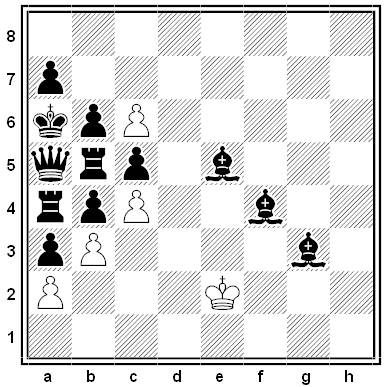
Physicist Roger Penrose devised this problem in 2017 to illustrate the difference between artificial and human intelligence. James Tagg, leader of the Penrose Institute, told the Telegraph, “A human looking at it for a short while will ‘see’ what white must, and more particularly, must not do, and use very little energy to decide this. But, for a computer, the puzzle requires an enormous number of calculations, far too many for even today’s supercomputers.” What is White’s insight?
|
SelectClick for Answer |
Penrose wrote, “If you put this puzzle into a chess computer it just assumes a black win because of the number of pieces and positions, but a human will look at this and know quickly that is not the case.” This is because most of Black’s pieces are entombed on the queenside; his bishops are free to move, but they can neither free the other black pieces nor checkmate the white king. Penrose explained:
If both players understand the position and play perfectly there is no way either player can win – black can always keep its bishops together so the white king cannot pick them off, and the 50-move rule would result in a draw. Human players understand this and don’t need to calculate the position.
However, we can see that Fritz (one of the better AI chess programs) looks ahead 20 moves and thinks black is winning. Fritz does not understand the nature of the position: It sees the material advantage and thinks it is ahead. The question is whether the human playing as white can use this lack of understanding to win. A small number of you ran the puzzle on chess programs and experimented with this.
Although we maintain that chess programs (such as Fritz and Stockfish) do not ‘understand’ the position, they played correctly and achieved a draw despite believing they had a likely win. However, some programs set to a low level of skill were so convinced they should win, they refused the draw through repeated position. They accepted losing the bishops one after another until they blundered into a losing position, allowing the white pawn on the sixth rank to be advanced and turned into a queen. To make this actually happen requires a bit of trickery and a great deal of patience.
“We know that there are things that the human mind achieves that even the most powerful supercomputer cannot but we don’t know why,” he added. “If we find out how humans differ from computers then it could have profound sociological implications. People get very depressed when they think of a future where robots or computers will take their jobs, but it might be that there are areas where computers will never be better than us, such as creativity.”
|

